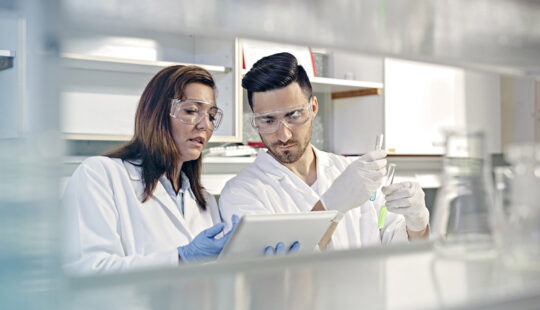Today marks the 50th anniversary of Earth Day. Amid the human tragedy currently unfolding, no one will be in the mood to celebrate. Yet we should not let this noteworthy milestone go by without reflecting what it stands for and recognizing the connection between a healthy earth and the health of all people who live here.
Earth Day 2020 is also a reminder of what is at stake if we fail to address another crisis that will determine our collective well-being in the long run: the climate crisis.
At SAP, we have always believed in a holistic understanding of sustainability that encompasses economic, social, and environmental impact creation within the planetary boundaries. This includes safeguarding the health and well-being of individuals as well as the planet. One cannot thrive without the other.
For several years we have been investigating the interconnectedness of all sustainability dimensions as they relate to the performance of our business. We share our findings in our Integrated Report and make them accessible to the public. But identifying the connections within our own operations is only the first step. As part of our engagement in the Value Balancing Alliance, we are working with like-minded businesses to transform how to measure and value a business’ overall societal impacts and dependencies. While this effort is still at the beginning, it is becoming more apparent how interwoven all dimensions in today’s world really are.
It is therefore not a question of whether it is more important to dedicate resources to economic, societal, or environmental development, or to the COVID-19 crisis or climate crisis. We need to strike a balance among all.
In these uncertain times, our immediate priority at SAP is to help by protecting our employees, providing open access to technology to tackle disruptions, ensuring business continuity for customers, supporting social sector partners, and more. But our long-term commitment to building a sustainable future remains unchanged.
Looking back to Earth Day 2019, I never could have imagined that one year later, this noteworthy movement would go completely digital for the first time in its history. I am confident, however, that this will not diminish the experience and impact. The extraordinary global lockdown has triggered unexpected creativity and a necessity to come up with new virtual formats and offerings. There is a parallel to sustainability that I believe to be an innovation driver because it equally requires us to rethink how we live and do business.
This gives me cautious hope for the post-pandemic reopening – a glimpse of light at the end of the tunnel of worry and concern.
During a recent virtual dialogue session with about 50 members of our grassroots group “Employees4Climate,” we discussed lessons learned from the pandemic for addressing climate change. An online poll uncovered that the majority see the impact of COVID-19 on climate action progress as an opportunity rather than a risk.
Employees pointed out that even the most skeptical among their peers, managers, and customers are learning that virtual collaboration can replace business trips and save travel time and stress. Fortunately, we had already identified this as a key measure to avoid carbon emissions and reach our goal to be carbon neutral by 2025. SAP had already established much of the infrastructure and equipped our teams with the necessary tools. This helped to minimize disruptions in our operations and support for customers.
The impact is obvious: The decline of business trips in March led to a reduction of SAP’s first quarter 2020 carbon emissions to 65 kilotons compared to 110 kilotons in the first quarter of 2019. And this is happening all over the world. China’s emissions are said to have fallen by 25 percent in three weeks and pollution in New York reduced by 50 percent compared to the same time of the previous year due to measures to contain the virus. Satellite images very clearly visualize the vanishing pollution in China and India.
These are side effects that are good for the planet as well as the health of people suffering from the pollution. Even as we find the silver lining, we cannot lose sight of the tremendous human and economic cost. The key question, as raised in a recent McKinsey article, is “how to find a paradigm that provides at once environmental and economic sustainability.” To this I would add social sustainability as well. Another key question is how to make the positive shifts in our habits last after the crisis recedes.
Again, I am hopeful. As we plan for the recovery ahead, it is not only the sustainability community envisioning an opportunity to reshape our economy. Policy makers, such as those in the EU, have elevated sustainability to a top security priority after the global coronavirus outbreak to decrease vulnerability to global supply chains. European Commission President Ursula von der Leyen wants to drive a circular economy with wiser use and re-use of resources to boost resiliency: “This is not only good for our environment, but it reduces dependency by shortening and diversifying supply chains.”
We all have a role to play in this. At SAP, we are as committed as ever to live up to our purpose to help the world run better and improve people’s lives by providing products and services that meet the sustainability challenges and opportunities of our customers, while leading by example in our own sustainable business operations and practices. Key focus areas for us include digital solutions for circular economy and climate action.
The past weeks have shown how critical it is to have full transparency and traceability of supply chains and manage our — and the planet’s — limited resources carefully for greater reliability as well as fair distribution.
The Earth Day organizers have suggested the day “should not be seen as a deadline but rather a spark that inspires future action.” As we jointly commemorate its 50th anniversary, let’s use this spark to reimagine a sustainable future after post-pandemic. I invite everyone to be part as we rebuild together to be more resilient, inclusive, and restorative, allowing all of us and future generations to thrive.
Daniel Schmid is chief sustainability officer of SAP SE.



